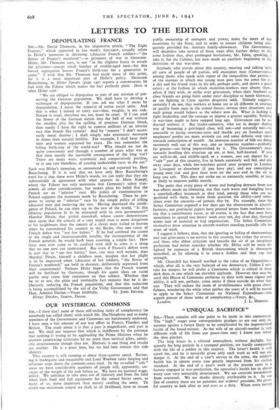OUR HYSTERICAL COMMONS
Sts,—I have alas! none of those self-sealing tanks of complacency (as somebody has called them) with which Mr. MacNaughton and so many members of the Government and Commons are handsomely endowed. I have seen a fair amount of our war effort in France, Flanders and Britain. The truth about it is that a part is magnificent, and part is not. We shall not improve that which is indifferent by the pretence that nothing is wrong or by applauding the Prime Minister when he answers penetrating criticisms by no more than satirical gibes, admir- able entertainment though they are. Rhetoric is one thing and results are another. He is a great man, but we had best remain this side idolatry.
This country is still running at about three-quarter speed. Ration- ing is inadequate and inequitable and Lord Woolton takes limping and reluctant steps down the common-sense road. In the so-called " safe " areas we have considerable numbers of people still, apparently, un- aware of the weight of the task before us. We have no national wage- policy. We continue to take men out of industry and from the land when both food and full equipment for the armed forces seem, to many of us, more important than merely swelling the army. To attain our maximum output we shall, in all likelihood, have to secure public ownership of transport and power, make far more of our munitions by the State, and in order to ensure children being ade-
quately provided for, institute family-allowances. The Government will doubtless take several of these steps after further delay; in the same fashion that, after prolonged hesitations, Mr. Eden, speaking, take it, for the Cabinet, has now made an excellent beginning in the definition of our war-aims.
Anybody who travels about this country, meeting and talking with all sorts of people of all parties, will encounter men (Conservatives among them) who speak with regret of the inequalities that persist— of the manner in which one young man goes into the army for 2s. a day and his friend stays in his job, perhaps unfit, and draws a good salary ; at the fashion in which munition-workers may absent them- selves if they wish, or strike over grievances, when their brothers or close friends are going forth under strict discipline to bomb Germany, or are fighting in Crete against desperate odds. Nobody suggests, certainly I do not, that workers at home are at all different in courage or quality from men in the armed forces; reverse their situations and each group would behave as the others now do. What is lacking is right leadership and the courage to impose a greater equality. Striking in war-time ought to have stopped long ago. Grievances can be re- dressed without it. But trades-unionists, who are in danger during war of becoming a privileged class, will not—and naturally not—be amenable to losing overtime-rates and double pay on Sundays until employers' profits are more severely cut and some definite step taken towards conscription of wealth. An immense number of folk are doing extremely well out of this war, and an immense number—probably far greater—are being impoverished by it. The Government's steps towards levelling this situation up are, at best, half-hearted. If you are well-to-do, and middle-aged, or a woman, you can depart for a " safe " part of this country, live in hotels extremely well fed, and idle away your days, while fire-watchers guard your property in London or Liverpool or elsewhere (if you have any), and our conscripted young men risk and give their lives on the seas and in the air to keep you safe. This does not strike me as eminently sensible, or just, or likely to improve public morale.
The point that every piece of waste and bungling detracts from our war-efforts needs no labouring, nor that such waste and bungling have a snowball-effect inasmuch as they tend, among those who are ac- quainted with them, to make them question the ability—and some- times even the sincerity—of powers that be. Fos example, since the Select Committee exposed a few days ago the absenteeism in aircraft- factories, our provincial papers have printed letters from workmen say- ing that a contributory cause, at all events, is the fact that men have sometimes to spread two hours' work over ten, day after day, through either lack of material or bad organisation. The Select Committee themselves drew attention to aircraft-workers standing partially idle for want of work.
I suggest it follows, then, that the ignoring or hiding of shortcomings and just grievances is no service to this country, but rather the reverse; and those who abhor criticism and breathe the air of an imaginary perfection had better consider whether Mr. Hitler will be more de- lighted by exposure of a British shortcoming which is thereupon remedied, or by allowing it to reman hidden and thus sap our strength.
Mr. Churchill has himself testified to the value of an Opposition— which, after all, is the very bulwark of our democracy. Unless I mis- take his temper, he will prefer a Commons which is critical in these
dark days, to one which too slavishly applauds. However that may be, until this House of Commons performs its duty with more vigour and ability, it will not, perhaps, come amiss if those outside do what the) can. They will endure the taunt of atrabiliousness with great cheer- fulness, wondering the while what epithet the users of it will be moved to apply to the Select Committee on National Expenditure—this superb piercer of those tanks of complacency.—Yours, &c.,


























 Previous page
Previous page